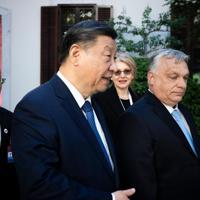


President Xi Jinping vowed to deepen already flourishing economic ties with Hungary during a visit to Budapest on Thursday, advocating that its closest European Union ally “play a bigger role” in fostering relations between Beijing and the bloc.
The state visit to Hungary is the final leg of Xi’s first European tour since 2019 that led him to France and Serbia earlier this week.
Following a meeting with Hungarian Prime Minister Viktor Orban on Thursday afternoon, Xi said Beijing placed “great importance” on its relations with the EU.
The Chinese leader also called on Hungary, which takes over the bloc’s rotating presidency in the second half of the year, to “play a bigger role in the EU and push for new and greater development of China-EU relations”.
Amid divisions with the West over the Ukraine war and global trade, both leaders stressed their shared views and demonstrated their close ties, announcing that 18 bilateral agreements had been signed.
Budapest was decked out with Chinese flags for the state visit and placed under tight security. The few flags held up by Tibetan demonstrators were hidden from Xi’s sight.
18 agreements
Earlier on Thursday, Xi and his wife Peng Liyuan were received with military honours by Hungary’s President Tamas Sulyok in the lavish courtyard of Budapest’s presidential palace.
According to a statement issued after the meeting, Xi said that the bilateral “relationship is now at its “best in history”.
Frequently at loggerheads with Brussels, Orban has pursued an eastwards foreign policy since his return to power in 2010, seeking closer economic ties with Russia, China and other Asian countries.
The nationalist premier remained committed to his strategy even as tensions between Western nations and Beijing have increased over human rights, the Covid pandemic, trade and Russia’s invasion of Ukraine.
Xi’s three-day visit to Hungary after passing through Paris — the only other EU capital on the itinerary — “shows Hungary’s growing importance in global politics,” Orban’s chief of staff Gergely Gulyas told a government briefing on Thursday.
Several new projects were announced on Thursday, including the construction of rail infrastructure, an oil pipeline between Hungary and Serbia, and cooperation in the nuclear sector.
Since Hungary began to promote itself as a global hub for electric car manufacturing in 2022, battery and car factories have sprung up all over the country, with investments of tens of billions of euros.
While the government says Hungary is benefiting from its partnership with China, opposition parties have raised concerns over a lack of transparency, the environmental impact of battery factories and corruption.
‘Lone voice in Europe’
The Chinese leader kicked off his tour in France, a visit that was cordial but also highlighted tensions between Beijing and the EU over the Ukraine war and global trade.
While French President Emmanuel Macron pressed Beijing not to support Russia’s war against Ukraine and to accept fairer trade, Hungary provided “a friendlier destination for Xi”, said political scientist Ja Ian Chong of the University of Singapore.
In Hungary, a country with close ties to Moscow and Beijing, Xi was able to “avoid tough conversations and awkward questions”, he added.
Both countries have called for a peaceful settlement of Russia’s war in Ukraine.
Orban on Thursday thanked China for its efforts “to promote peace and prosperity in the region”, describing Hungary as “a lone voice in Europe”.
“Hungary provides a diplomatic win for Xi, showing his warm ties with an EU member state that will still roll out the red carpet for Chinese investment,” said Xiaoxue Martin, a researcher at the Clingendael China Centre.
On the streets of Budapest, many tourists were astonished by the heavy security, with police blocking access to sites.